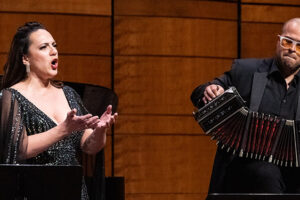
Janácek’s Makropulos Case has only chalked up thirteen performances in three previous runs at the Met and will have just five more this season. Try to catch at least one. Emilia Marty, the glamorous diva even more ageless and immortal than most divas, is a role Karita Mattila has finally and happily taken on after long experience of the same composer’s moving, far less mercurial Jenúfa and Ká?a Kabanová.
Marty/Makropulos profits from Mattila’s feline allure, her still powerful soprano – and the athleticism of her zaftig physique: No Bollywood anorexic here, but a Mitteleuropaische Venus. Few opera composers have ever suited her so well as does Janácek’s jagged lyricism. (Mattila has, of late, taken to singing Italian operas far less sympathetic to her gifts.) Janácek holds Marty’s big moment back until the opera’s conclusion, but she is central to all that has preceded it. Mattila delights in flashing changes of mood and manner from prima donna hauteur to dreamy reflection to erotic scorn.
Jirí Belohlávek draws a superb, tense, dynamic reading from the Met orchestra, and the production, designed by Elijah Moshinsky for Jessye Norman, remains appealing but perverse, often at odds with the story being told.
The last time the Met revived The Makropulos Case, for Catherine Malfitano, I overheard a couple after the performance comparing the opera with Karel Capek’s play, the source of Janácek’s libretto. They turned out to be running a theater company in D.C. where it had been staged. As I’ve never seen or read the play, I asked them how it differed from the libretto. A very Shavian deal, apparently, the last act containing a lengthy dispute about what sort of humans would best profit from living three hundred years. In the opera, this has been boiled down to a simple message: At the end of so long a day Marty/Makropulos is just tired, and only two things still matter: opera and alchemy.
Capek got the idea of a 300-year lifespan from Back to Methuselah, Shaw’s Wagnerian cycle of five strenuous plays. Besides keeping his version to a single play, Capek humanized it, turning the first scenes into a squabble about a family bequest. A mysterious lady, a great diva, knows the true story and where the evidence was hidden – in 1816. But how did she know this, and so many other secrets? We are teased and tantalized until we accept the impossible premise: She is 337 years old.
But unlike the characters in Back to Methuselah, she has no desire to save the human race. She was given an immortality potion by her father, a Greek alchemist at the court of Prague’s fairy tale monarch, half-mad Emperor Rudolph II, the patron of Tycho Brahe and Kepler among other quacks. Making his heroine an opera singer all but guaranteed that some composer would swoop upon Capek’s curious little play, and that glamorous divas would find the role hard to resist.
(Quibble: If Elina/Emilia’s body has stood still for 300 years, opera certainly hasn’t. You can’t sing Verdi in a Monteverdi style. Presumably she vanishes every decade or so to change not only her name but also to refigure her vocal production. More opera singers ought to do this, actually, after operations or as the voice matures. Marty has probably forgotten everything she knew about singing Vivaldi, Gluck or Donizetti. I wonder what she’d say if interviewed? That no one can really sing anymore; that young singers just don’t have the old dedication; that contemporary opera composers are idiots? No doubt.)
Capek was the literary star of Prague between the world wars and shone all the brighter because, unlike his fellow Prague Jew, Kafka, he wrote in the national tongue. Capek’s gift lay in finding inhuman symbols for the human condition: In War with the Newts, enslaved intelligent lizards revolt and conquer the world. In Insect Comedy, human society is seen through bug-eat-bug metaphors. In his most famous play, R.U.R., Capek took the Czech word for feudal service owed by serfs, “robot,” and gave it to humanoid machines – who rise and exterminate their masters.
Elina Makropulos/Emilia Marty is a mythic figure in the tradition of Faust and Dorian Grey and many ancient tales: If we could have the immortal youth we think we desire, would endlessness take all the zing out of existence? We might as well tell ourselves, as Emilia tells us, that life without death is no life at all, since we’re never going to find the Makropulos elixir vitae. As Dorothy Parker might say, You might as well die.
In the first staging of the opera in these parts, Frank Corsaro’s production for Maralin Niska at the New York City Opera, Marty’s frantic search for her father’s lost manuscript was equated with an addict’s search for a fix – life itself being the drug of choice. (This was in the seventies, remember.) There were films and projections, avant-garde for the time, and Niska bared her svelte back to reveal her scars.
More recently, Nikolaus Lehnhoff’s Glyndebourne staging was brought to BAM with Anja Silja. The opera’s three short acts played with only a single break on a turntable stage that never stopped moving. If attention chanced to stray from Silja’s riveting performance – she truly seemed to exist in a world apart from the petty concerns of the other characters, untouched by them, barely concerned with them, bored, half-hysterical – we were made nervous by the perpetual motion of the stage, the unstated sense that time was running constantly, and out.
In contrast, Moshinsky at the Met (who evidently returned to work on the current revival) does not trust the material. People’s behavior does not match the lines they sing – from the lawyer’s clerk who should be looking through file cabinets to the cleanup crew backstage whose lines imply they are stunned by what they have heard but whose body language says they are merely bored. Matthew Plenk’s Janek looks quite personable, not the monosyllabic dunce stunned into suicide by the diva’s glamour.
Marty, confronted by her ancient lover, Hauk, does not slowly remember him and their affair of half a lifetime ago (when she was Eugenia Montez), but immediately swings into a Spanish dance. Her tawdry dressing room, the site of Act II, is incongruously filled with a four-story sphinx on which Jessye Norman (and now Mattila) sat enthroned, evidently identifying with the existential riddle. Mattila, far from exhausted, tosses her body and her shapely legs across desks and sofas and men at the slightest opportunity – the same gesture that her Tosca made after the murder of Scarpia though a different sofa. Well, it is a shapely leg, but must it be so central to a performance that she can and usually does make stunning and personal by far more legitimate means?
The Met has surrounded Mattila with a worthy supporting cast. Johan Reuter makes his debut as the saturnine Baron Prus, exhibiting a dark baritone that fills the house without barking. Richard Leech, who has been away from the Met stage for far too long, sings Albert Gregor, Marty’s benefactee and ardent suitor, unaware that he is also her great-grandson. In fact, Leech looks disconcertingly older than Mattila – Albert admits he’s led a rather dissipated existence – but he sounds young, ardent and in tiptop shape, with a power in the higher lines that suggest him as a possible Lohengrin.
Emalie Savoy, another debutante, has not quite grasped Krista’s naïve awe of the prima donna’s aura, and her final gesture of burning the formula of immortality when the dying Marty gives it to her has been undercut by the director’s interference. Alan Oke and Tom Fox played the lawyers’ palaver as if these intricacies mattered – which is the way to play them, so that later revelations will shock us – and Bernard Fitch has fun as the elderly Count Hauk, though he looks at us and not at his just-recognized long-lost love when he tells his story. (Malfitano’s Marty used to maul her Hauk, tickling and toying him like a puppy.) Jane Shaulis and Edyta Kulczak make us sit up and adjust our ears in their brief but impressive walk-ons.
Mattila’s Makropulos is one of the events I have been eagerly awaiting through a long dull season; I was not disappointed and I’m still humming the score.
(Illustration based on a photo by Cory Weaver, Metropolitan Opera.)























Comments